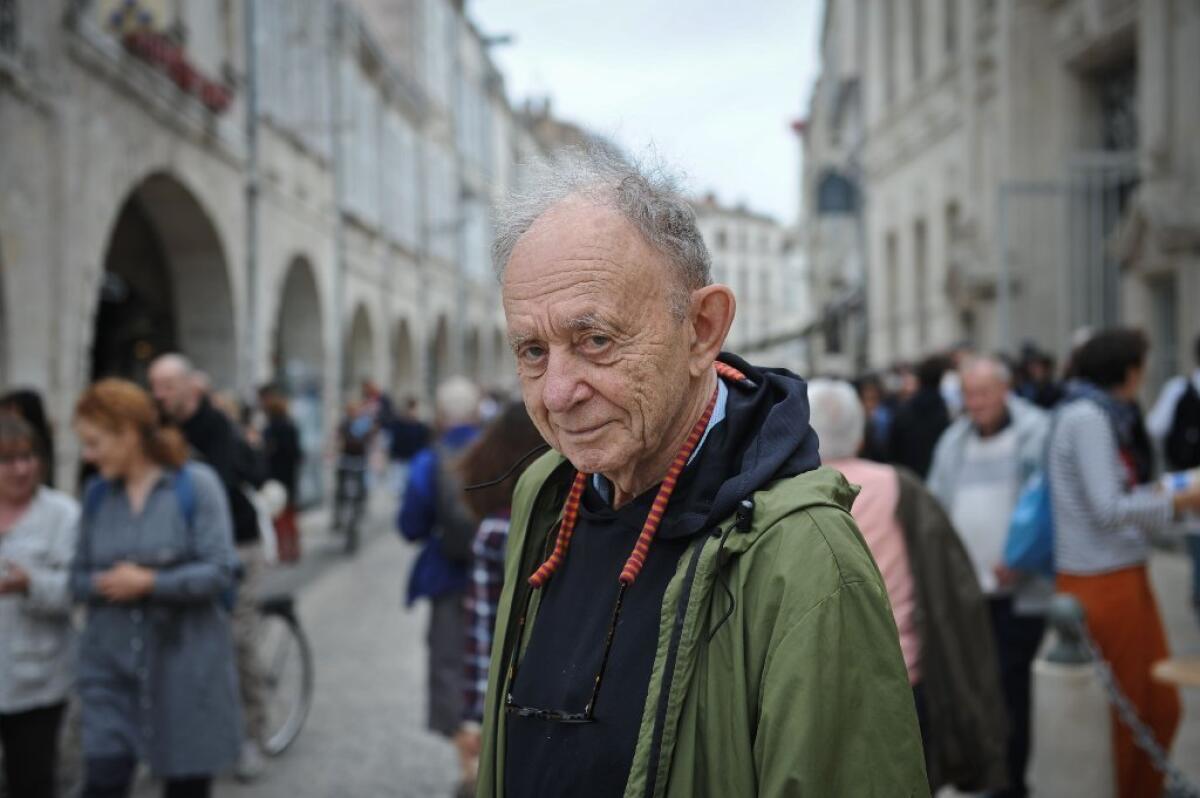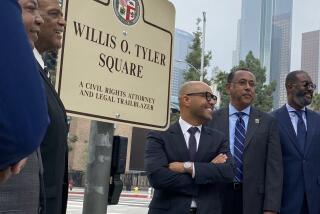Critic’s Choice: Frederick Wiseman’s first decade of docs kicks off a vital retrospective

One of the timeliest, most urgent movies you can see in a Los Angeles theater next month was first shown nearly 50 years ago, not long after the assassination of Martin Luther King Jr. and the devastating race riots that followed in its wake. Among the cities hit the hardest was Kansas City, Mo., which is where a 39-year-old documentary filmmaker named Frederick Wiseman turned his camera on the daily travails of police officers, most of them white, struggling to protect and serve their predominantly African American community.
The result was a galvanizing but remarkably fair-minded documentary called “Law and Order” (1969), and the decades since have only clarified its insights and deepened its emotional force. Like so much of Wiseman’s work over the last several decades (he’s 86 and still makes about a film a year), the movie reveals a vivid, teeming human ecosystem in painfully intimate shards and fragments, each one snapping into a complex larger pattern of sociological and narrative meaning.
But the prescient power of this particular documentary goes beyond its technique. To watch “Law and Order” today is to experience the uncanny feeling that, its raw and jagged black-and-white images notwithstanding, the movie could have been made yesterday, perhaps amid the still-cooling embers of another racially divided Missouri town called Ferguson.
It is all but impossible to confront the movie’s appalling scene of a white officer placing an African American woman in a violent chokehold and not be reminded of the death of Eric Garner in New York. But it’s just as hard not to be moved by the sensitive cop who urges his colleagues to temper their language and their minds when out on patrol. Or the officer who responds with fatherly protectiveness and compassion to the plight of a young black girl, frightened and weeping, her parents nowhere to be found.
In short, there is frustration here but also optimism, prejudice but also decency. Above all there is Wiseman’s principled refusal to settle for easy answers, to demonize his subjects, or to shy away from the complexities that animate every individual and institution that passes before his camera.
Although it was made well before Wiseman fully established his reputation as one of the masters of the documentary form, “Law and Order” rests comfortably, but never complacently, among his finest achievements. It is among the essential offerings (his first 10 films, made from 1967-76) set to screen at Cinefamily in the opening installment of a comprehensive retrospective of Wiseman’s body of work. (The other 33 films in the series will screen in 2017, 2018 and 2019, making this one of the city’s most significant film events not just this year, but also the next three as well.)
The retrospective begins Aug. 27 with a newly restored 35-millimeter print of Wiseman’s landmark 1967 debut, “Titicut Follies,” an astonishing record of the abuses endured by inmates at a Massachusetts institute for the criminally insane. Censored by the state for decades on the grounds that it violated patients’ privacy rights, the film’s catalog of horrors can still feel like a shock to the system; at the time, it established an incendiary, muckraking tone that eventually subsided as Wiseman pursued an ever more intricate way of seeing his subjects.
Even still, the elements that make Wiseman’s documentaries such exemplars of storytelling integrity were all there from the start — the patience of his immersive, exploratory method, the careful balance of distance and intimacy, and the scrupulous avoidance of voice-over, talking heads, dramatic reconstructions and other familiar shortcuts of nonfiction filmmaking. Above all there was his astute and ingenious fascination with the institution as a deeply revealing window into the heart of everyday American life.
He followed “Titicut Follies” with “High School” (1968), one of his most engaging movies, and one in which you yearn to follow every thread for just a few minutes longer after Wiseman cuts away. A scrappy forerunner of his longer, denser portraits of educational systems, “High School II” (1994) and “At Berkeley” (2013), the film (also screening in a 35-mm restoration) runs just 75 minutes and serves as a bracing reminder of the economy and impact that Wiseman could achieve before the epic running times of his later work.
Also clocking in under an hour and a half is the unforgettable “Hospital” (1970), which makes the rounds at New York’s Metropolitan Hospital Center and takes on a wrenching, almost spiritual dimension in its study of the body in extremis. One famous scene, a lengthy phone call between an exasperated doctor and a never-seen welfare worker with the memorable name of Miss Hightower, forms a bridge between this film and “Welfare” (1975), Wiseman’s nearly three-hour investigation of a broken and unruly aid system, and a film that, no less than “Hospital,” rivetingly explores the interplay of clients and workers, of intense need on the one hand and continually thwarted compassion on the other.
Wiseman has been the first to concede that his work, far from adhering to some pure, unfiltered standard of cinematic objectivity, is entirely dependent on a clear, intelligent storytelling strategy and a keen understanding of dramatic rhythm, even if the rhythm is less emphatic than most. The restraint of his methods — his unwillingness to tell you what to think of what he’s showing you, or even let on what he might think — should never be mistaken for a pose of neutrality.
Ambivalence may be the more accurate descriptor. It’s instructive to look at a film like “Meat” (1976), with its grueling and meticulous study of the American farming system, in contrast with a more polemically inclined film like Robert Kenner’s “Food, Inc.” (2008). In Wiseman’s work there is almost always the sense that, regardless of which building or profession or industry he’s exploring (or whatever the movie’s title may be), his true subject remains unstated and elusive.
You learn about more than just the day-to-day military operations at Fort Knox in “Basic Training” (1971), just as “Juvenile Court” (1973) illuminates something beyond the harsh conditions and accusations that bring children and teenagers into early conflict with the justice system. Wiseman’s pictures are models of specificity, but what remains constant from film to film is a sense of personal identity being warped and consumed by the larger workings of the establishment.
And yet the triumph of his cinema is that the human will — however fogged, frustrated and beset by institutional incompetence and bureaucratic tedium — continues to assert itself. That’s especially true in “Essene” (1972), a spellbinding, richly human examination of life in a Benedictine monastery near Three Rivers, Mich., and a unique Wiseman joint insofar as the resolution of conflict through intense, impassioned argument is not just a byproduct of the community’s operations, but very much an end in itself.
“Essene” concludes with a beautiful sermon about Jesus’ time with Mary and Martha that, in its lesson about the necessity of work and the even deeper need for physical and spiritual communion, seems to crystallize Wiseman’s filmmaking ethos in miniature. Again and again, the monk asks his congregants: “Will you listen?” Here is a filmmaker who has clearly never stopped.
------------
‘The Complete Works of Frederick Wiseman Pt. 1 (1967-1976)’
Where: Cinefamily, 611 N. Fairfax Ave., Los Angeles
Price: $12, free for members
Contact: (323) 655-2510, www.cinefamily.org
“Titicut Follies”: Aug. 27-31
“High School”: Sept. 2-4, Sept. 7
“Law and Order”: Sept. 10
“Hospital”: Sept. 16
“Basic Training”: Sept. 24
“Essene”: Oct. 1
“Juvenile Court”: Oct. 8
“Primate”: Oct. 15
“Welfare”: Oct. 22
“Meat”: Oct. 29
justin.chang@latimes.com | Twitter: @JustinCChang
More to Read
Only good movies
Get the Indie Focus newsletter, Mark Olsen's weekly guide to the world of cinema.
You may occasionally receive promotional content from the Los Angeles Times.







